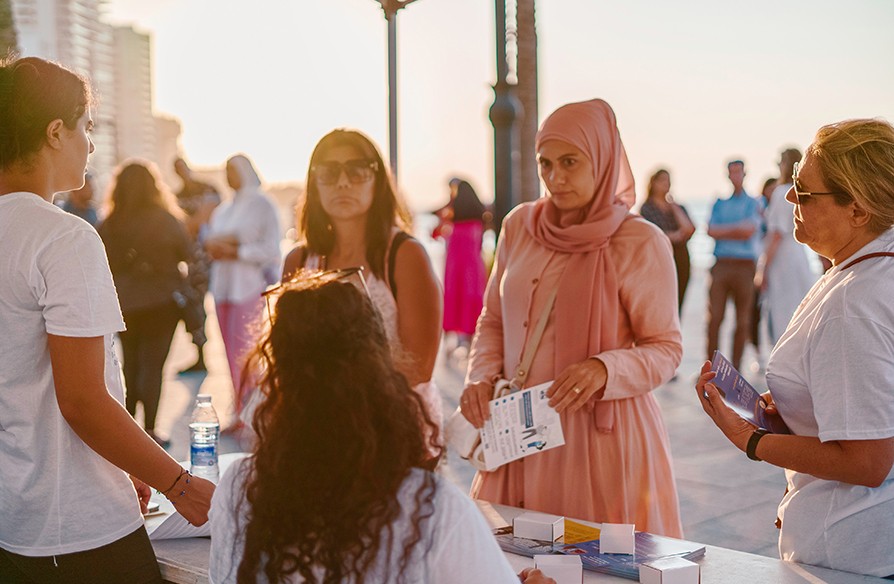Blog
Tackling sexual harassment in Lebanon: Law 205 and the Women, Peace and Security Agenda
Siren is supporting Lebanon's security agencies to advance Resolution 1325, tackle sexual harassment and enhance gender equality.

In 2020, Lebanon’s Parliament passed Law 205, a landmark law criminalising sexual harassment that represents a critical first step in expanding access to justice for survivors of sexual and gender-based violence. However, without a plan or funding for implementation, multiple obstacles hinder its effective enforcement across the judicial system. Perpetrators also often get away with their actions due to a lack of awareness of what constitutes sexual harassment. The normalisation of sexual harassment through victim blaming and minimising abuse is another challenge.
Security agencies are, however, beginning to take steps to reduce barriers to reporting and build public trust that gender responsive action will be taken to bring justice to survivors. Lebanon’s Police, the Internal Security Forces, are now proactively conducting awareness raising campaigns to promote reporting and prevention measures, alongside more comprehensive efforts to tackle gender discrimination and promote women's participation in security issues.
Police-community action against sexual harassment
Beirut’s seaside Corniche, as one of the few remaining public spaces in the city where families and youths gather, is an important place to tackle sexual harassment. The promenade, where can pedestrians stroll and many play sports in the morning, snakes around the Mediterranean for kilometres. In a survey of 175 individuals on the Corniche conducted by Siren in March 2022, a concerning 77% of people polled felt that sexual harassment was a threat there.
The ISF has responded by training bicycle patrol officers on what constitutes sexual harassment according to Law 205, as well as appropriate procedures for handling such cases. During August 2023, the ISF also coordinated with women's safety organisation Becky’s Button* in two awareness raising campaigns on the Corniche about Law 205 and the ISF’s reporting procedures.
Ahla Fawda, a Lebanese partner organisation to Becky's Button, mobilised volunteers to install a kiosk and offer passers-by the opportunity to receive a personal alarm that emits a piercing sound in the event of a verbal or physical assault. They explained that this can be used to frighten off attackers, while giving the victim time to run and report the incident. Around 120 people have signed up so far. ISF officers meanwhile spoke with passersby about how they're enhancing police response. They distributed leaflets containing guidance on some proactive steps, such as trying to walk in groups when going through dark and poorly lit areas, and how to get in contact with the ISF if something occurs.
“The fact that the ISF is raising awareness about this shows that it has become a concern, likely due to the ongoing security challenges we've been encountering. So being prepared is wise in such circumstances,” one woman in her mid 20s told Siren. “I’ll tell my girlfriends to register for the button. Thoughts about potential ‘what if’ situations often cross our mind when we go out at night.”
Systematic efforts needed to stamp out sexual harassment
Visible campaigns such as these are a commendable first step to operationalising Law 205. Conducted jointly by the police and local community groups, they send a powerful message that sexual harassment will not be tolerated, while offering actionable guidance on what to do if an incident occurs.
For greater effect, Siren's Women, Peace and Security focused programming is ensuring that these campaigns are part of more comprehensive efforts to advance UN Security Council Resolution 1325 (the WPS Agenda). Doing so will empower security agencies to systematically tackle sexual harassment in a gender sensitive manner, while advancing gender equality.
The need for this is real. One ISF officer on the Corniche told local media that women come to the ISF “all the time” complaining about sexual harassment, but that many refuse to file a complaint at the station because the process takes time and “the matter is over.”
Other barriers to reporting are also present in the wider security and justice sectors. The International Commission of Jurists has identified, for example, that more gender-sensitive investigations would help reduce impediments to women’s access to justice for sexual and gender-based violence. It has also highlighted the need to enhance justice actors’ capacity, logistics and resources so that women can enjoy their full right to access justice, and the need to tackle the prevalence of gender stereotypes and discriminatory attitudes among judicial officials.
Advancing the WPS Agenda in Lebanon
Gender audits are a pivotal starting point for a comprehensive approach to advancing the WPS Agenda and tackling sexual harassment. These audits assess the degree to which a security agency’s operational and organisational activities contribute to ending all forms of discrimination against women and girls, and systematically promote the full and meaningful participation of women at all levels. Once the audit process is complete, agencies can address the areas identified for improvement. Siren is currently supporting the ISF and General Security to conduct gender audits, with funding from the United Nations Development Programme.
Promoting the use of data and analysis in policing is another enabler of a more systematic approach to stamping out gender-based violence and sexual harassment. Through the British Policing Support Programme, Siren is supporting the ISF’s Analysis and Planning Teams to produce strategic threat assessments concerning violence against women and girls. Promoting the involvement of women analysts is central to this. The insights from these analytical products will inform ISF commanders on how to address priority issues that endanger the safety of women and girls, and enable them to develop operational plans and deploy resources accordingly.
Siren is in parallel supporting the ISF to identify areas where tangible improvements are feasible in the current context. Part of this involves mapping the domestic violence response landscape and the ISF’s role in it. Our ongoing research in this area will enable the ISF to better close the gaps in implementing Law 293, which protects women and family members against domestic violence.
——
*Rebecca Dykes, known as Becky, was a humanitarian worker who was violently raped and murdered by a cab driver after a night out in Beirut. Becky’s Button emerged because of this violent incident, which highlighted the need to protect the safety of women and girls.

